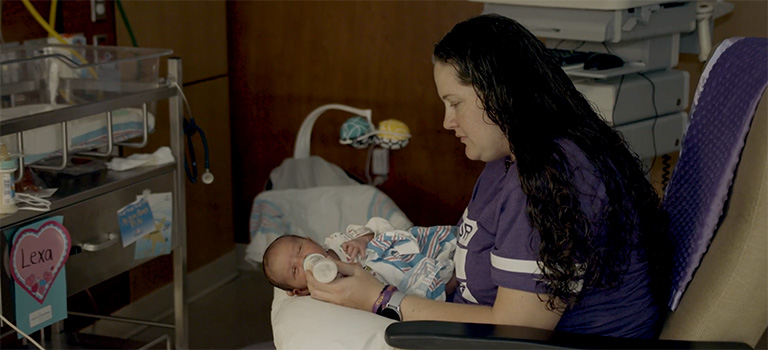By Miranda Dunnam, CCLS – March of Dimes NICU Family Support Program Coordinator
Whether just for a few hours or a couple of months, having a baby in the NICU is incredibly stressful for parents. It may be hard to think about taking care of yourself during this time because you’re so focused on your baby’s needs. However, physically and emotionally caring for yourself helps ensure you stay well and have the energy to spend with your new baby. Below are a few tips to help you through your time with a baby in the NICU.
Physical Health Tips:
- Listen to your providers. Moms, make sure you follow all directions from your medical team about your postpartum care. While your baby needs extra care, you are still recovering from childbirth. Take all medicines and keep all follow-up appointments.
- Stick to a daily routine. All NICU caregivers need to eat healthy foods and meals and drink water regularly. It helps to set alarms because caregivers often lose track of time while recovering and being in the NICU. A very helpful idea is to have family and friends send individually packed snacks and bottled water for quick nourishment while at the NICU and while recovering at home.
- Some ideas include apple slices with peanut butter, juices, granola bars, sandwiches, popcorn, and pre-cut fruit and vegetables.
- Get a good night’s sleep. It is very hard to sleep when your baby is in the NICU, but sleep is essential for good health. We recommend that NICU parents speak to the NICU social worker and/or your own medical provider if you are unable to sleep during your baby’s NICU stay. You will not sleep all night, but a good four-hour stretch each night is helpful.
Mental Health Tips:
- Come to the NICU as much as you can. Get to know your baby. Help us learn about their patterns, likes, dislikes and communication. Let your baby hear your voice and feel your touch-they are comforting and familiar to your baby.
- Hold your baby. Holding your baby is some of the best medicine for babies and parents. Sometimes babies are too sick to be held, so ask the NICU staff how to provide a healing touch (hand hug or containment hold). Holding a baby relieves anxiety for the baby and the parents, so skin-to-skin holding is always our goal when the baby is ready.
- Ask for support. Woman’s is proud to partner with March of Dimes to offer the NICU Family Support Program, including a NICU Family Support Program Coordinator on staff. This premier program offers family education, staff training on family-centered care and an improved patient experience with the help of March of Dimes experts. We encourage you to participate in the provided activities and ask the NICU staff if you need more information.
- Understand your emotions. Please remember that every emotion you feel is a normal reaction to an abnormal situation. Having a baby in the NICU is very stressful for parents. Most parents of babies in the NICU feel many positive and negative feelings at the same time. This is because your heartfelt connection with your baby includes both joy and pain.
- There is no “normal” way to feel. You and your partner or support person may react or feel differently. Share your experiences and listen with empathy so that you can each feel supported and heard.
- Take breaks from the NICU. Allow yourself to leave your baby’s side when you can. While your baby needs you, it is also important to make time for yourself, your partner, and your other children. Take time to do things you enjoy like read a book, listen to music, or exercise. These restful breaks will help you find the strength to keep going.
- Keep a journal. Expressing your feelings on paper can help you cope with your emotional changes. A journal also strengthens your hope and patience by reminding you how far you and your baby have come.
- Vent your frustrations. If your baby has a setback, you may be plunged back into fear and anxiety. Voice your worries and concerns with your NICU team. We are here for you.
- Celebrate when you can. It is okay to experience joy when your baby makes progress. We love to celebrate baby’s developmental milestones and have many printed Milestone Cards to show off progress!
- Explore your spiritual side. It might be helpful to reflect and lean on your spiritual beliefs. You may find comfort in talking with a pastor, priest, rabbi, minister, or imam. It is normal for a NICU experience to challenge your religious and spiritual beliefs; however, prayer, meditation, or quiet reflection can help you find emotional strength and hope during this challenging time. Woman’s has a chapel on the first floor near the cafeteria and we have chaplains who visit the NICU regularly.
- Accept the support of others. It may seem difficult, but it is okay to ask for and accept help. Let people know how they can best help and support you. This could include asking for a meal or snacks for you and your family at home or the hospital, help with older children, or transportation to and from the hospital. You want to share the baby’s progress on social media and they can help with this.
While these tips are a good starting point, many NICU parents need more. NICU parents often need to meet with their own medical provider(s) for postpartum depression and/or postpartum anxiety. Any major changes in your feelings or everyday life are worth exploring with your doctor or other healthcare professionals. If you find yourself needing additional support, ask your child’s NICU social worker for help finding the right option.
*Information provided by March of Dimes and Woman’s Hospital.

